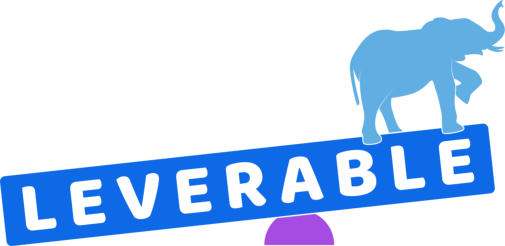With all the political turmoil we’re seeing, we thought it good to seek wisdom from a true influencer, Machiavelli himself. Thanks for the inspiration, Lyndon and execution, Gabriella!
Linkbait idea: “10 Top ways Machiavelli would have used Twitter”, I would read such an article.
— Lyndon Antcliff (@lyndoman) December 9, 2010
Niccolò di Bernardo dei Machiavelli was a philosopher, diplomat, playwright and civil servant, among other things. Although many today have never heard of him, he is considered a leading force and founder of modern political science.
What Machiavelli wanted most was an independent Italy; his strongest interest was discussing the elements of power. He was fascinated with it, and set the precedent for calculated actions. His business was preservation of power. In fact, he dedicated several writings and most of his life to understanding how things like human nature, power, fortune, luck and timing work.
Walk with me, if you will. Travel back to 15th century Renaissance Florence. A brilliant legacy is unfolding; literature, painting, architecture and sculpting abound. The political landscape is unstable; popes wage wars, trying to bring the city-states into the fold. Political-military alliances change without warning…
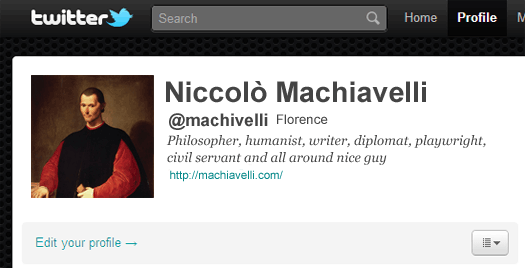
– And Machiavelli, newly elected as head of Florence’s second chancery, is walking around with a Twitter account.
5. Gaining Attention
A younger Machiavelli saw that mercenary troops seemed to be unreliable. Their actions, to him, were either treacherous or cowardly. Auxiliary troops weren’t reliable either, being loyal to their own country rather than their employer. They wouldn’t listen.
He believed armies created of volunteer citizens were more effective. As well, these citizen-soldiers showed characteristics important in any army: civic virtue, discipline, patriotism and the ability to identify with the army’s leaders. He writes Report on the Pisan War, and sends it to Soderini, the then Gonfaloniere of Justice:
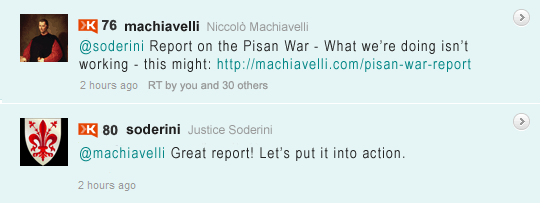
What We Learn:
In business or politics: A superior may not listen to an outpouring of words. However, a well-thought out document outlining your points can grab their attention in ways that your spoken words may not.
In using social media: Tailoring your titles and content toward your market will force their attention.
4. Building Connections
For three years, Machiavelli ran the Florentine militia and the held the defense of the City in his capable hands. He found himself in charge of the Pisan war, which had been waging off and on for over ten years. His 10,000-strong army built entirely of citizen-soldiers won.
He used his connections to get ideas and help:
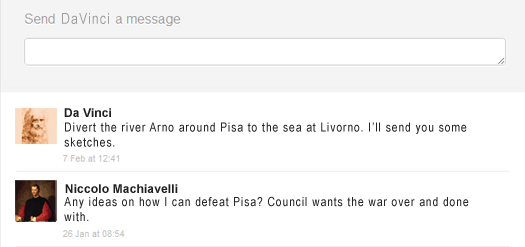
– And then reached out to his followers and fellow citizens:

What We Learn:
In business or politics: The right connections can go a long way toward the success of your goals. However, the power of like-minded citizens (or employees) is invaluable to implementing change.
In social media: Machiavelli used his connections to gain helpful insight and then reached out to his followers. You build a following and a fan base for a reason – leverage your social connections.
3. Staying Organized
The Pisan war wasn’t the only war Machiavelli dealt with; it was just the first one. His diplomatic mission to the King of France wasn’t the only mission – just the first. Yet, with all the positions he filled, Machiavelli maintained control of the organization.
When they prepared for war, he scheduled tweets to keep everything synchronized. He also made sure he could reach his chosen captains.
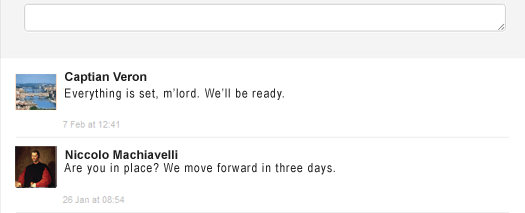
What We Learn:
In business and politics: “No enterprise is more likely to succeed than one concealed from the enemy until it is ripe for execution.” Machiavelli kept his plans to himself unless absolutely necessary. As politicians have already learned, anything with an important outcome should be on a need to know basis.
In social media: Whether you talk privately in DM or out for everyone to see, don’t forget that sometimes Twitter is the best way to reach people. If you have a message to get out, do so by any means necessary – even if it’s Twitter. A surprising amount of business gets done behind the scenes.
2. Building Reputation
Gaining respect, giving out information, setting up rules and guidelines, leading by doing instead of talking, credibility, trust, respect, experience, influence, connections, reputation, responsibility… all of the things we talk about with ORM, networking and reputation building are the principles Machiavelli lived by.
Machiavelli gained a reputation by putting his words into action. As a political diplomat, he visited the courts of the King of France and the Holy Roman Empire, the Papal court of Rome and the court of Siena, among others.
These diplomatic missions gave him a unique opportunity to study and explore the various ways rulers exercised their power. Machiavelli built an influential reputation by setting up rules and guidelines for rulers, and freely sharing tips on how a successful prince should rule his country:

He willing shared his thoughts on fortune, money, timing and power, whether they were controversial for the time or not:

He published several discourses (what we would call articles) based on his principles, and several reports (whitepapers):

What We Learn:
In business and politics: One person, leading by example, can strongly influence others. This person can become a thought leader, motivator – an example of innovation.
In social media: Even knowing many of his thoughts were highly controversial, Machiavelli was not afraid to share his knowledge. He didn’t worry about what people would think when publishing his works.
As you strive to build your reputation through social networking and media, through blogging, article writing and so on, don’t be afraid to share something just because it might be controversial. Through controversy and discussion comes change. You, too, can be a thought leader.
1. Learning from Others
Perhaps Machiavelli’s greatest genius was the willingness to keep his eyes and ears open. As an empirical scientist, he believed knowledge came from experience. Science should not be based on theory or “imagination”, but on physical evidence. It is this scientific outlook that built most of his core beliefs on power.
As he watched the actions of Cesare Borgia, the Duke of Valentinois, he was amazed by how this energetic Italian ruled. Cesare didn’t let anything get in the way of what he saw as necessary policy, including oaths, promises, pity or religion.
To his superiors in Florence, he tweets:

In fact, the only true weakness Machiavelli sees in Cesare’s rule is the dependency on the Good will of the Papacy (controlled by Cesare’s father). This causes Machiavelli to add a new Daily Ruler Tip:

What We Learn
In business or politics: Pay attention to your contemporaries. When they succeed, determine why they succeeded and imitate them. When they fail, determine why they failed and make sure not to make the same mistakes.
In social media: When others follow and learn from you, you have a responsibility to provide the best information possible. Don’t send your thoughts and links out into the Twitterverse without listening to the feedback.
Pay attention to other tweets. When you see one you don’t like, figure out why it bothers you. When you see one you really like, figure out why you like it. Build the quality of your online engagement based on what you learn.
Conclusion
Machiavelli was a fascinating man. To some, he was fascinating because of his realistic view of politics: that a ruler cannot afford to be swayed by morals, ethics, religion or pity. If a ruler is swayed, it must be by what is best for his country, regardless of personal values.
To others, he was pure immorality. His name has become synonymous with deception. The way he viewed politics – as something that should be guided entirely by considerations of expediency – was seen as being entirely again ethics, morals or religion. “The end justifies the means.”
The founding fathers of the United States followed many of Machiavelli’s beliefs – but so did Hitler.
So what do we really learn from Machiavelli’s life and (potential) use of Twitter? At the end of it all, there’s really only two lessons you can’t afford to miss, whether for politics, business or social media:
- Be true to your goals – not once in his entire life did Machiavelli deviate from his goal of a stronger Italy.
- Be willing to change your tactics – his goal never changed, but his methods of reaching the goal did.
What about you? What do YOU think Machiavelli would have done if Twitter and social media had been around?
